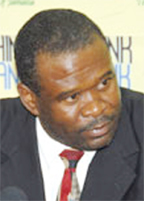By Mark McGowan in Grenada
By the end of this year, Guyana and the other eleven countries in the Caribbean Single Market and Economy (CSME) should have their companies’ registers in electronic form and available online as part of a project being pushed by the Caricom Secretariat’s CSME Unit.

Programme Manager for the Unit Ivor Carryl yesterday said that the aim is to have a networked electronic system that would allow the Secretariat to collect information regularly as to the number of companies being formed, in which countries etc.
This, he explained, would provide an idea as to the level of economic activity taking place. The new system, Carryl said, would also be beneficial to all 12 CSME members state since useful information can be gotten from the database. He was at the time addressing participants at a CSME Workshop for Newspaper Editors currently ongoing in St. George’s, Grenada.
During a brief interview with this newspaper, Carryl said that the first part of this exercise was to see how far the registries in these countries were far from being IT-ready. He said that after determining this the role was to move them to the full state of readiness and this would have included “putting in technology, buying equipment, fixing it up and training the people. Some territories, he said, had already been putting the technology in place.
Asked specifically about Guyana, Carryl stated that “the Registrar in Guyana said that they have been doing a lot of the IT work already…but what they needed was people to do the data entry operations. They need 9 people to load up the data because they have close to a million records that they need to computerize and we are going to provide those.” Funding for the project has been made available through CIDA and the European Union.
Addressing the gathering, Carryl explained that one of the major challenges with implementing the integration regime is creating the institutions to carry out what was agreed by the policy makers. He said that the decision by the policy makers would influence new laws which would need new institutions to be created. He said that 75 percent of the community is struggling to find the resources they need to create such institutions and to make them fully operational. Carryl also said that the absence of regulations and the systems made it difficult for persons “to access the CSME”.
Referring to the economic imbalance within the grouping, Carryl said that economic data going back twenty years indicates that 75 percent of the regional economy is spread across five countries- Jamaica, Trinidad, Barbados, Guyana and Suriname. The other 25, he said, is spread across the LDCs. He noted that while some of these states have prospered, using measurements such as the Gross Domestic Product (GDP), their share of the regional economy remains small. He said that the CSME would not be a sustainable entity if this kind of economic imbalance is perpetual.
According to Carryl, a study has already been conducted into the reasons for this phenomenon, and that instructions have been given by the Heads for a Strategic Plan to be produced by January 2011. This report, he said, will include not only how they will fix the problems but how the efforts required to fix them will be financed.
Meanwhile, Carryl said that there are many naysayers regarding the achievement of a single market and economy in the region especially the apparent lengthiness of the process. He, however, pointed to the fact that the treaty under which the CSME was formed only came into operation on the 1st January 2006. He stressed too that progress has definitely been made citing among other examples the success stories of skilled persons being able to move freely across the region. Asked to assess percentage wise the progress made towards the full implementation of all aspects of the CSME, Carryl estimated this to be about 40 percent.
The CSME consists of the majority of the 15 Caricom member states with the exceptions of Haiti, Montserrat and The Bahamas.
